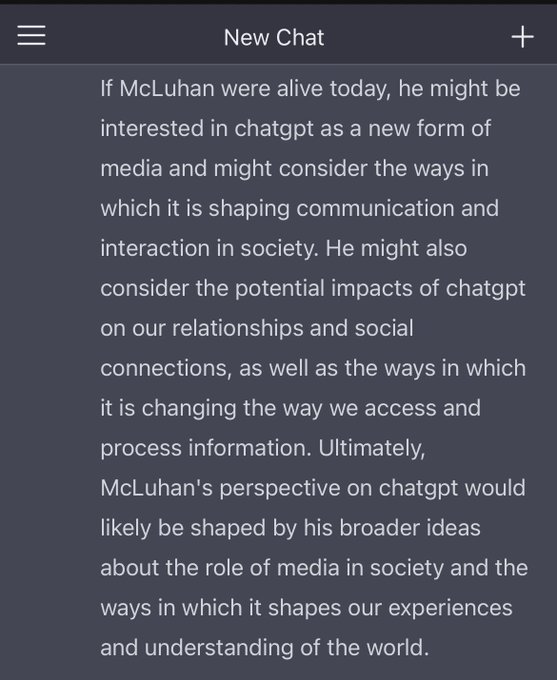The world changed forever at the end of this past November. If you aren’t a very online person, you may not have any idea what I’m talking about. But if you do spend much time online, particularly on Twitter, you are aware of ChatGPT.
ChatGPT is a chatbot powered by artificial intelligence. It is certainly not the first chatbot nor is it the first program to use “artificial intelligence.”[1] ChatGPT makes those other advancements in AI look like Teddy Ruxpin by comparison. In mere seconds, this chatbot can give clear and carefully nuanced answers to complicated questions.
Many users have been unnerved by the chatbot’s ability to communicate in ways that are indistinguishable from human interaction, showing surprising creativity and even humor. I asked it to write an ode to Michael Jordan in the style of Homer and this is what it gave me after two seconds of “thinking.”

Imagine Google, but instead of merely linking you to websites, you are given the exact answer you are looking for. Naturally, technology like this excites a lot of people, justifiably so. We have not even begun to skim the surface of potential applications. Just this past Sunday, my friend used ChatGPT to come up with five discussion questions on Mark 12 for a Sunday school class he was teaching. The questions were actually really good.
Of course, a technology this powerful is also freaking out a lot of people, justifiably so. I don’t personally subscribe to the theory that technology automatically kills jobs (history just doesn’t support this theory), but this technology has kindled fears that the robots are coming not just for blue collar jobs but also white collar and even creative jobs.[2]
“This technology has kindled fears that the robots are coming not just for blue collar jobs but also white collar and even creative jobs.”
Educators have wondered aloud how this is going to change education. Google made information available instantaneously, but it couldn’t do all of your research and write your paper for you. ChatGPT is like having the smartest person in school do all your homework for you free of charge. One creative user on Twitter figured out a solution to students using ChatGPT to write their papers. It involves professors using the technology to grade their papers. Basically, you have a closed loop where the bots are doing the work and grading the work while the student collects his diploma and the professor collects his paycheck.
It remains to be seen how this technology will change industries like education. For some, it presents an almost irresistible temptation to laziness. To others, it presents exciting opportunities for creativity. We may not know exactly what changes a technology like this will introduce, but we can be sure that changes are coming and those changes will likely be significant.
It’s important to recognize, however, that technology doesn’t just change industries; technology changes those who use it. Any time a new technology is introduced and widely adopted, the definition of what it means to be a human in the world changes often dramatically. It is an ironclad rule of technology that it cannot be adopted without changing those who use it. So how might this rule be applied to ChatGPT?
“Technology doesn’t just change industries; technology changes those who use it.”
Philosopher Marshall McLuhan[3] said that technology works as an extension of various parts of our body. A hammer is an extension of the arm. Binoculars are extensions of the eyes. A car is an extension of the foot. Etc. As extensions, technology amplifies our natural powers. We can lift more, see at greater distances, and move faster—all while exerting ourselves less.
There is a trade-off though. All of these extensions have a numbing effect. Think of agricultural technology as an example. Every technological invention makes the farmer more efficient and more effective, but every invention also removes the farmer further and further from the land. He has lost “feeling” of the land because of how much technology has extended him.
Think of social media as another example. Social media extends our social connections with other people, but it also numbs us to real community with others as we settle for a mediated connection through a computer screen.
“There is a trade-off though. All of these extensions have a numbing effect.”
What do technologies like Google or ChatGPT extend? The simplest answer is that they extend our brain. They give us access to a world of knowledge in a very short amount of time. We are able to know more than any humans ever. But this extension has also caused societal numbness. Our relationship with knowledge has become more passive over time. We don’t have to mine for gold; it’s always available, just a click away.
As a result, knowledge is cheapened and the quest for knowledge is regarded as a foolish waste of time. Why ride a bike when cars exist? Why cook when processed food exists? Why learn a new language when Google Translate exists? Why go out with friends when Facebook exists? Why learn anything when the computer will do the work for you?
You see where I’m going. My concern is that advanced technologies like ChatGPT will make us numb to knowledge. We will just stop caring about creating, studying, learning, discovering. Why bother? Such numbness will come to shape our entire lives. Someone made this provocative point on Twitter recently.
It is clear that this is going to happen because it is already happening. There are millions of people who already have access to all of the world’s knowledge yet they can’t come up with a good reason to get out of bed in the morning. Consider the fact that 7 million men aged 25-54 in the USA are not working. Instead, they are putting in 2000 hours of screen time every year. That’s nearly the equivalent of a 40 hour work week.
“We will just stop caring about creating, studying, learning, discovering.”
There are undoubtedly many reasons for this phenomenon, but digital technology has certainly encouraged it. Try to imagine this percentage of men opting out of the work force in a pre-digital age. A population over twice the size of Chicago has been made completely numb to life.
Whenever artificial intelligence enters into the public imagination, our thoughts turn toward apocalyptic fears of the robots taking over. We think of the violent overthrow of human civilization by machines in movies like Terminator or The Matrix. There’s always been an itching paranoia that accompanies technological progress which is reflected in popular culture.
I think it is unlikely that if the robots take over it will be particularly violent. We will not be chased down by terminators. No, instead the robots will take over by lulling us to sleep. We will gradually over time surrender our humanity to our machines.
[1] I have a lot to say about artificial intelligence, but I’ll have to save it for some other post. Briefly, I’ll just point out that there is a world of difference between artificial intelligence and artificial consciousness. Consciousness is much more than exercising programing—even if that programming is incredibly advanced. Consciousness consists of, among other things, self-awareness and “aboutness.” Conscious beings are aware they are conscious beings and they are able to think about things. With that said, no matter how “smart” a program is, any perceived consciousness is just an illusion. I am dubious about whether it is actually within our grasp to create artificial consciousness because I don’t believe that consciousness is an emergent property. But again, that’s a post for another day.
[2] It’s not the point of this post, but a lot of content creators have raised ethical concerns about tech companies using their content in their AI algorithms without giving credit or compensation.
[3] I asked ChatGPT to tell me what Marshall McLuhan would think about ChatGPT. Here was its response. Not bad.


From chadragsdale.wordpress.com. Used with permission.











